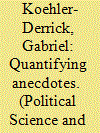| Srl | Item |
| 1 |
ID:
169916


|
|
|
|
|
| Summary/Abstract |
Historians of terrorism note that modern terrorists rely almost exclusively on two weapon types: the gun and the bomb. However, the comparative use of these weapons differs from one terrorist group to the next. We exploit this variation to examine how the tactical decisions of terrorists respond to both strategic aspirations and resource constraints. We argue that a group’s goals (a strategic consideration) and size (a resource constraint) provide a parsimonious explanation for weapon selection. Because firearms inherently expose the shooter to higher risk, are more precise, and must be used if a group aspires to maintain social order, they are unlikely to be used by groups with limited recruits in a campaign of violence. We test this theory using data on over 350 terrorist organizations. Our analysis shows that strategic considerations and resource constraints both impact tactical choices, although groups with the most expansive goals, those which transcend national borders, as well as militias, are two interesting exceptions to our theory. Our research has implications for the use of disaggregated tactical data and in furthering our understanding of the rationality of terrorism.
|
|
|
|
|
|
|
|
|
|
|
|
|
|
|
|
| 2 |
ID:
121623


|
|
|
|
|
| Publication |
2013.
|
| Summary/Abstract |
The events of 2011 transformed the politics of the Arab world. In just under 12 months, dictators fell in three countries: Tunisia, Egypt, and Libya. In Bahrain, Yemen, and Syria, protests and violence continued throughout 2012 to shake what were once assumed to be the solid foundations of long-standing autocratic regimes. Although it is too soon to assess the outcome of these events, one immediate consequence is clear: the empowerment of public opinion in Arab politics. For the first time in more than 50 years, the voices of average Tunisians, Egyptians, and Libyans can directly influence political outcomes. This shift may yet prove to be temporary, but its importance in driving current events cannot be discounted.
|
|
|
|
|
|
|
|
|
|
|
|
|
|
|
|
| 3 |
ID:
191912


|
|
|
|
|
| Summary/Abstract |
A distinguishing feature of the modern state is the broad scope of social welfare provision. This remarkable expansion of public assistance was characterized by huge spatial and temporal disparities. What explains the uneven expansion in the reach of social welfare? We argue that social welfare expansion depends in part on the ability of the governed to compel the state to provide rewards in return for military service—and crucially, that marginalized groups faced greater barriers to obtaining those rewards. In colonial states, subjects faced a bargaining disadvantage relative to citizens living in the colony and were less likely to win concessions from the state for their wartime sacrifices. We test this argument using a difference-in-differences research design and a rich data set of local spending before and after World War I in colonial Algeria. Our results reveal that social welfare spending expanded less in communes where the French subject share of the population was greater. This paper contributes to the state-building literature by highlighting the differential ability of the governed to bargain with the state in the aftermath of conflict.
|
|
|
|
|
|
|
|
|
|
|
|
|
|
|
|